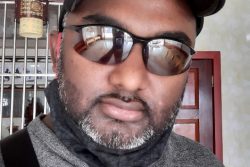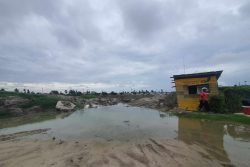Dear Editor,
With characteristic bluster and half-truths, the General Secretary of the PPP in his press conference last Thursday, found it necessary to spend much time accusing the PNC of promoting racism. A clear case of the “pot telling the kettle he bottom black.” Let me briefly share my knowledge and the facts related to this demonic situation of race and racism. I grew up in Charlestown and before I was born, my father established, during the 1930s, the only drugstore to serve the communities of Charlestown/Albouystown/ La Penitence/Ruimveldt, at the corners of James and Barr Streets. The drugstore served as the hospital, a centre for the exchange of ideas, offering of advice and peace-making. From childhood, I spent many hours in the drugstore and developed a healthy, harmonious and loving relationship with all the people and never experienced the slightest bit of racism or prejudice. The Wongs, Chins, D’Aguiars, De Santos, Paltoos, Ramsaroops and the Defreitas were all one family. Occasion-ally, my father was asked to settle disputes mainly between Muslims and Hindus, never between any other groups. Many got the impression that my father seemed to like Indians more than the other groups. That is my background. That is what influenced my responses all the days of my life.
My father was known for his honesty and kindness and people would leave their money in bits of paper and cloth with him for safekeeping. This led to him establishing the first indigenous bank in Guyana, the People’s Benefit Scheme, where people in the south of Georgetown banked their money. I saved two Ledgers available for anyone to examine. Because of my parent’s popularity, when Daniel Prabudass Debidin sought political leverage, he invited my father to chair a well-attended meeting at St. Thomas’ School in Ketley Street, opposite the home of my Godmother, Carmen Gibson who was, for me, my second mother. Her husband, Cyril Gibson, mother was an Indo-Guyanese and father, a European. The children, Shirley Chin, Junior Gibson, Lorna and Gomes, we all grew up as one family. At the meeting where my father took me, Debidin broke off to address in Urdu- Hindi the Indians in attendance. My father understood a few words in Urdu-Hindi and took my hand and walked out of the meeting. We understood that he was telling the Indians present to support him because he was an Indian. It is there this destructive, nasty phrase “Apan Jaat,” had its beginning.
After leaving Queens College, I began working with Cheddi Jagan and Forbes Burnham, moving around getting people from the waterfront, estates etc. interested and telling them that as a result of the Waddington Commission, for the first time in history, people got a right to vote once they were twenty-one years old. Previously, you had to qualify to earn the right to vote, either based on your salary or value of property you owned. In spite of the bombardment of anti-communist leaflets, the Burnham-Jagan led-PPP emerged victorious. After a few months in office, the British suspended the Constitution on the grounds that Dr. Jagan and his ministers were taking Guyana into the Communist bloc. Differences on how to deal with this troubling situation led to the split of the PPP into two factions. When the split occurred, the prominent Indo-Guyanese, including Dr. JP Latchmansingh and Jainarine Singh came out in support of Burnham, while some of the Afro-Guyanese leaders, such as Bowman and others supported Dr. Jagan. This is the irony, if not mystery, of how history followed. So we had a PPP Burnhamite and a PPP Jaganite. Allow me therefore to make this indisputable point – race had nothing to do with the distinguishing character of the two parties.
After the 1957 Elections, the PPP Burnhamite faction met and decided to end this charade of the two PPP entities and named the group, the People’s National Congress, a combination of the names of the major parties in India and the African Gold Coast colony now known as Ghana. By then, the Jaganite PPP ignited the call to vote race “Apan Jaat.” This spread like wildfire, swift and destructive. An example, Sydney King contested the lower East Coast Constituency. King was very popular among the people in that community. He refused to be a candidate for either the Jaganite or the Burnhamite factions, and contested as an individual. The PPP Jaganites introduced a relatively unknown political personality, Balram Singh Rai, an Indo-Guyanese. The Burnhamite PPP did not field a candidate to avoid votes’ splitting. On beating the drum of Apan Jaat, Rai defeated King by a narrow margin. It is the PPP that started this destructive business of race in our local politics. This continues unabated to this day.
Whatever you may think and say of Forbes Burnham, he was no idiot, but a man of vision and perspicacity. At that time and unto this day, Indians outnumber Africans in Guyana, thanks to the machinations of the plantocracy and wiles of our erstwhile masters, who provided the ships to transport large numbers of Indians as indentured labourers to Guyana, to replace the labour of the freed Africans on the cotton and sugar plantations. Therefore why should the PNC, according to the analysis of the PPP and others, seek to fan the flames of racism? The truth is the PNC has always sought to win over non-Africans into its ranks. The top brass of the PPP did everything to tear asunder these efforts and have for generations used this imperial system for their political advantage. The murder, mayhem and Maginot lines, particularly in the coastal belt, was the handiwork of trained PPPites who assumed this was a pathway to Power, Progress and Prominence.
This hostile environment caused Sydney King to establish the African Society for Closer Relations in Indepen-dent Africa (ASCRIA). He also called for the partition of our country as a solution, where Afro-Guyanese and Indo-Guyanese would have a Government of their own. Because of the concerns of many citizens who were being victimized, and their families traumatised, many felt partition was a feasible solution, particularly with PPP activists shouting “awe pon top”. When King proposed that the country be partitioned into zones as a solution to our racial difficulties, it was appealing to many. At a meeting with PNC executives, Burnham in his usual persuasive eloquence said partition was not the solution and I remember him saying, “we must not allow frustration and fear to be the foundation upon which to build our nation-state, but rather, we should strive to bring all of our people on board to fend off the tricks and stratagem of Massa.” This should be our position if we are to bequeath to our descendants a great, peaceful and prosperous nation-state. This represented the position then and now of the People’s National Congress. This was and remains the position of the PNC. The rest is history. How therefore can the PPP top brass continue this rhetoric that the PNC is playing the race card?
Sincerely,
Hamilton Green
Elder






